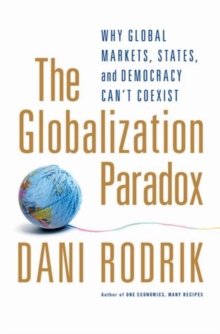Description
| Product ID: | 9780199652525 |
| Product Form: | Paperback / softback |
| Country of Manufacture: | GB |
| Title: | The Globalization Paradox |
| Subtitle: | Why Global Markets, States, and Democracy Can't Coexist |
| Authors: | Author: Dani Rodrik |
| Page Count: | 370 |
| Subjects: | Globalization, Globalization, Macroeconomics, Political economy, Economic systems and structures, Macroeconomics, Political economy, Economic systems & structures |
| Description: | Select Guide Rating Globalization, Rodrik argues, rests on shaky foundations. Despite the benefits it has brought to much of the world, there are profound conflicts of interest between democracy, national determination, and full economic globalization. He traces the idea's history, pinpoints its weaknesses, and points the way forward to a new 'smart globalization' For a century, economists have driven forward the cause of globalization in financial institutions, labour markets, and trade. Yet there have been consistent warning signs that a global economy and free trade might not always be advantageous. Where are the pressure points? What could be done about them? Dani Rodrik examines the back-story from its seventeenth-century origins through the milestones of the gold standard, the Bretton Woods Agreement, and the Washington Consensus, to the present day. Although economic globalization has enabled unprecedented levels of prosperity in advanced countries and has been a boon to hundreds of millions of poor workers in China and elsewhere in Asia, it is a concept that rests on shaky pillars, he contends. Its long-term sustainability is not a given. The heart of Rodrik''s argument is a fundamental ''trilemma'': that we cannot simultaneously pursue democracy, national self-determination, and economic globalization. Give too much power to governments, and you have protectionism. Give markets too much freedom, and you have an unstable world economy with little social and political support from those it is supposed to help. Rodrik argues for smart globalization, not maximum globalization. |
| Imprint Name: | Oxford University Press |
| Publisher Name: | Oxford University Press |
| Country of Publication: | GB |
| Publishing Date: | 2012-05-17 |


